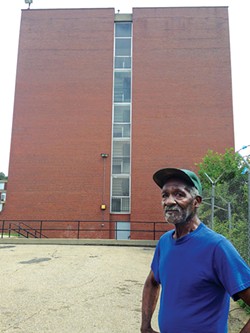The large Penn Plaza lot on Penn Avenue, between Negley and Euclid avenues, has been owned by the Gumberg family, or LG Realty Advisors, since 1966, when they purchased it from the city's Urban Redevelopment Authority (URA). The initial mortgage was financed through the Federal Housing Administration (FHA), which provided a government-funded safety net against losses as the result of homeowners defaulting on their mortgage loans.
While carrying this mortgage, the owners were subject to an FHA agreement that states that the owner shall make dwellings available to occupants at charges not exceeding those established by the FHA commissioner. Penn Plaza spent more than 30 years as a federally regulated, rent-controlled residence.
However, once its mortgage was paid off — around 2000, according to U.S. Dept of Housing and Urban Development Pittsburgh Office Director Jane Miller — its owners were no longer subject to those requirements.
Today, after weeks of uncertainty about the buildings' future, Mayor Peduto says that LG Realty plans to renovate the property as a mix of retail and housing.
"We have been in discussion with the owner," says Kevin Acklin, Peduto's chief of staff. "We want to ensure the project will move forward in a manner that addresses the future of affordable housing in East Liberty."
ELDI's Pelling says that any major changes to the structures would have to go through a public process. Most of the 140 residents who attended the Saturday meeting voted unanimously to form a tenant council. That means they will have organized representation before city officials, which could make major changes to the site contentious.
Peduto told City Paper that after redevelopment, the Penn Plaza residents would be given priority to access affordable units. But in the meantime, there is nowhere for them to stay in East Liberty, given that thousands of people are already waiting to find affordable units there.
The Coalition of Organized Residents of East Liberty states that over the past 15 years, 764 subsidized units have been lost. However, ELDI says that over the past decade, hundreds of new subsidized units have been added in the community, for a current total of 694.
Accounting for the 41 threatened affordable units at Penn Plaza, it seems likely that East Liberty has hundreds fewer affordable units than it did 15 years ago. (That total doesn't include Penn Plaza's other 271 nonsubsidized units with below-market rents.)
Pelling says future ELDI projects will create from 120 to 130 new affordable units in the neighborhood, but that still leaves a significant affordable-housing gap.
"We cannot afford to lose that many units. We want the Gumbergs to hold off on their plans," says ELDI Executive Director Maelene Myers. "My preference is to keep those families in their homes. If they do not maintain affordable housing, we got a major community fight on our hands."
Understandably, the residents want to stay in Penn Plaza. Taylor hopes that some kind of tenant ownership could be worked out for at least one of the property's six buildings. (In 2008, the Northside Coalition for Fair Housing, with financing from the URA, was able to purchase more than 300 affordable units scattered throughout the North Side after a hard-fought, 10-year process.)
"We stayed here and lived through the bad — why don't we get to live through the good?" says community advocate Alethea Sims, who lived in the East Mall high-rise prior to its demolition. "Something has to be done. Low-income residents are getting pushed out in the name of progress. It has to stop."















